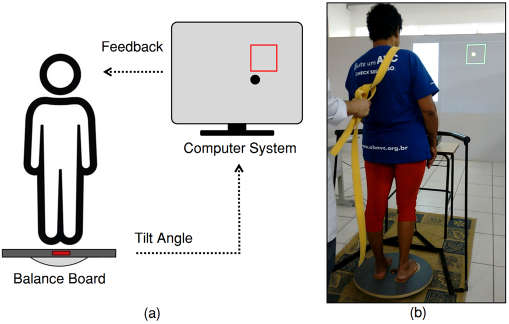 Hemiparetic stroke patients can have several muscular and postural disorders which compromise their balance. Serious Games (SG) emerged as a new approach to enhance conventional treatment by making it a motivating method to meet individual needs. This paper evaluated the therapeutic effects of a biomedical SG system developed for balance evaluation and training of hemiparetic stroke patients. The system consists of a balance board with inertial sensors and a computer system that runs the game. A novel scoring system for balance evaluation which extracts metric information regarding patients’ performance while gaming was proposed. A quasi-experimental study was performed with six hemiparetic patients in an exercise program using the SG twice per week for 10 weeks. Twelve healthy subjects were recruited for determining the baseline score for balance by using the proposed system. Significant Effect Sizes (ES) were observed for dynamic balance (ES=0.9), functional mobility (ES=0.4) and center of pressure displacement of the balance board (ES=1.9). Significant correlations between game scores and clinical scales suggest that the use of the scoring system for balance evaluation is feasible. The results of this study support the clinical potential of a biomedical SG for balance rehabilitation of hemiparetic stroke patients.
Hemiparetic stroke patients can have several muscular and postural disorders which compromise their balance. Serious Games (SG) emerged as a new approach to enhance conventional treatment by making it a motivating method to meet individual needs. This paper evaluated the therapeutic effects of a biomedical SG system developed for balance evaluation and training of hemiparetic stroke patients. The system consists of a balance board with inertial sensors and a computer system that runs the game. A novel scoring system for balance evaluation which extracts metric information regarding patients’ performance while gaming was proposed. A quasi-experimental study was performed with six hemiparetic patients in an exercise program using the SG twice per week for 10 weeks. Twelve healthy subjects were recruited for determining the baseline score for balance by using the proposed system. Significant Effect Sizes (ES) were observed for dynamic balance (ES=0.9), functional mobility (ES=0.4) and center of pressure displacement of the balance board (ES=1.9). Significant correlations between game scores and clinical scales suggest that the use of the scoring system for balance evaluation is feasible. The results of this study support the clinical potential of a biomedical SG for balance rehabilitation of hemiparetic stroke patients.

